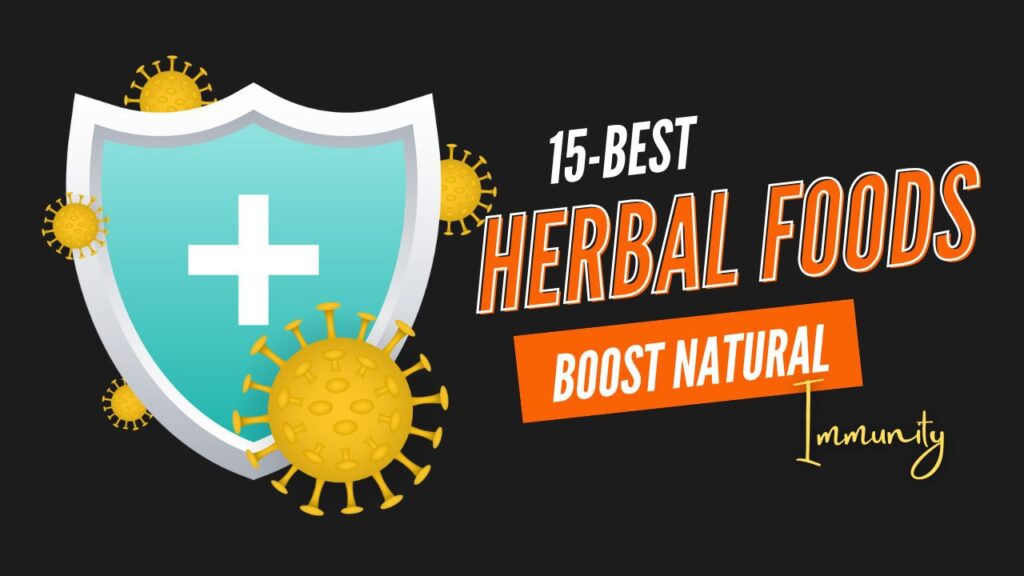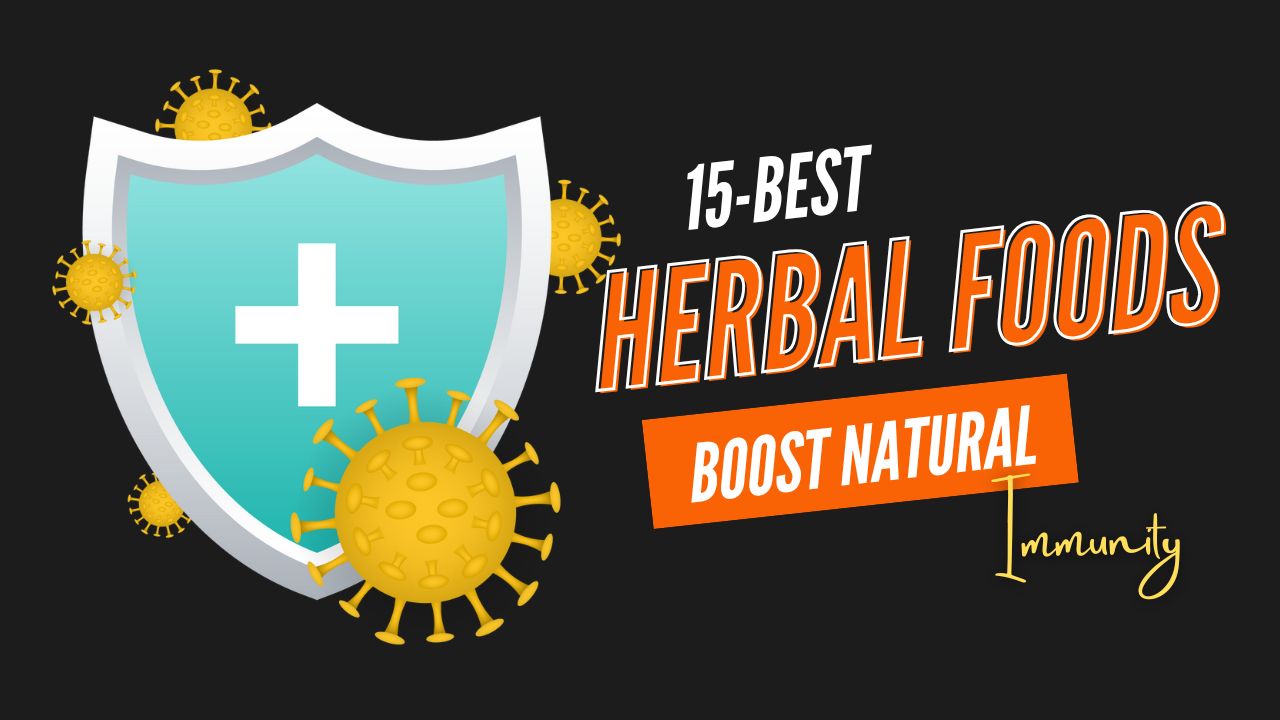Did you know that around 70% of your immune system is located in your gut? This means what you eat directly influences how strong or weak your immunity is.
While modern medicine plays a vital role in keeping us healthy, nature has always been our first line of defense.
Herbs and herbal foods have been used for centuries across cultures—from Ayurveda in India to Traditional Chinese Medicine—to fight infections, speed up recovery, and keep energy levels high.
If you’ve ever struggled with frequent colds, slow recovery from illness, or low energy, the solution might not just lie in pills but on your plate. By incorporating certain immunity-boosting herbal foods, you can strengthen your body’s natural defense system against viruses, bacteria, and seasonal changes.
In this post, we’ll explore 15 powerful herbal foods that can supercharge your immunity, along with how to eat them, who should consume or avoid them, storage tips, do’s and don’ts, and possible side effects.

Table of Contents
15 Best Herbal Foods To Eat
1. Garlic
Best Ways to Eat or Use It
- Eat raw in salads or crush a clove and mix with honey.
- Add to soups, curries, and stir-fries.
- For best results, crush and let it sit for 10 minutes before cooking to activate allicin, the main immune-boosting compound.
Who Should Eat / Avoid
- Good for: people prone to colds, those with high cholesterol, and individuals seeking heart health.
- Avoid/Limit if: you have stomach ulcers, low blood pressure, or are taking blood-thinning medication.
Storage & Buying Tips
- Choose firm, fresh bulbs without green sprouts.
- Store in a cool, dry place; avoid refrigeration.
Do’s & Don’ts
| ✅ Do | ❌ Don’t |
|---|---|
| Eat fresh cloves daily | Overcook—it reduces potency |
| Crush before cooking | Store in the fridge (causes sprouting) |
Possible Side Effects
Excess consumption may lead to heartburn, stomach upset, or bad breath.
2. Ginger
Best Ways to Eat or Use It
- Add fresh slices to tea, smoothies, or soups.
- Use powdered ginger in baking or herbal tonics.
Who Should Eat / Avoid
- Good for: people with digestive issues, nausea, and inflammation.
- Avoid/Limit if: you are pregnant (excess use may cause contractions) or on blood thinners.
Storage & Buying Tips
- Pick firm roots with smooth skin.
- Store in the fridge for 2–3 weeks or freeze for long-term use.
Do’s & Don’ts
| ✅ Do | ❌ Don’t |
|---|---|
| Use fresh ginger for maximum benefits | Store peeled ginger uncovered |
| Add to warm water for tea | Overuse if you have acid reflux |
Possible Side Effects
Excess intake may cause acid reflux or mouth irritation.
3. Turmeric
Best Ways to Eat or Use It
- Mix in curries, soups, and rice dishes.
- Drink as turmeric milk (“golden milk”).
- Combine with black pepper for better absorption of curcumin.
Who Should Eat / Avoid
- Good for: those with arthritis, inflammation, or frequent infections.
- Avoid/Limit if: you have gallstones, kidney issues, or are pregnant (in large doses).
Storage & Buying Tips
- Choose organic turmeric powder or fresh roots.
- Store powder in airtight containers, away from sunlight.
Do’s & Don’ts
| ✅ Do | ❌ Don’t |
|---|---|
| Combine with black pepper | Consume in very high amounts |
| Use fresh turmeric root | Store in humid places |
Possible Side Effects
Too much may cause stomach upset or interfere with medications.
4. Holy Basil (Tulsi)
Best Ways to Eat or Use It
- Brew tulsi tea daily.
- Chew fresh leaves on an empty stomach.
Who Should Eat / Avoid
- Good for: people with stress, respiratory issues, and weak immunity.
- Avoid/Limit if: pregnant or breastfeeding.
Storage & Buying Tips
- Use fresh leaves or dried tulsi tea.
- Store dried leaves in airtight jars.
Do’s & Don’ts
| ✅ Do | ❌ Don’t |
|---|---|
| Drink tulsi tea daily | Consume during pregnancy |
| Use fresh leaves when possible | Overuse if you have fertility concerns |
Possible Side Effects
May reduce fertility in high doses.
5. Cinnamon
Best Ways to Eat or Use It
- Add to tea, coffee, or smoothies.
- Sprinkle over oatmeal or toast.
Who Should Eat / Avoid
- Good for: diabetics, people with high cholesterol.
- Avoid/Limit if: you have liver disease (due to coumarin in cassia cinnamon).
Storage & Buying Tips
- Buy Ceylon cinnamon for safer use.
- Store in airtight jars away from moisture.
Do’s & Don’ts
| ✅ Do | ❌ Don’t |
|---|---|
| Use in moderation daily | Use cassia cinnamon in excess |
| Pair with honey for immunity | Store near heat sources |
Possible Side Effects
Too much may damage the liver.
6. Black Pepper
Best Ways to Eat or Use It
- Sprinkle freshly ground pepper on dishes.
- Combine with turmeric for stronger effects.
Who Should Eat / Avoid
- Good for: people with poor digestion and low immunity.
- Avoid/Limit if: you have ulcers or stomach sensitivity.
Storage & Buying Tips
- Buy whole peppercorns and grind fresh.
- Store in airtight containers.
Do’s & Don’ts
| ✅ Do | ❌ Don’t |
|---|---|
| Grind fresh before use | Overconsume—it irritates stomach |
| Pair with turmeric | Store in humid conditions |
Possible Side Effects
Excess can cause stomach irritation.
7. Cloves
Best Ways to Eat or Use It
- Add whole cloves to soups, teas, or curries.
- Use clove oil (diluted) for toothache relief.
Who Should Eat / Avoid
- Good for: people with dental problems, respiratory issues.
- Avoid/Limit if: pregnant, children, or those with liver issues.
Storage & Buying Tips
- Choose whole cloves with a strong aroma.
- Store in airtight jars.
Do’s & Don’ts
| ✅ Do | ❌ Don’t |
|---|---|
| Use for teas and curries | Use clove oil undiluted |
| Store in glass jars | Overuse daily |
Possible Side Effects
May cause liver issues in high doses.
8. Fenugreek
Best Ways to Eat or Use It
- Add seeds to curries or soak overnight in water and drink.
- Use leaves in parathas or salads.
Who Should Eat / Avoid
- Good for: diabetics, nursing mothers.
- Avoid/Limit if: pregnant women (may trigger contractions).
Storage & Buying Tips
- Store seeds in airtight jars.
- Use fresh fenugreek leaves within 2–3 days.
Do’s & Don’ts
| ✅ Do | ❌ Don’t |
|---|---|
| Soak seeds for better absorption | Overuse during pregnancy |
| Use leaves in cooking | Store leaves for long periods |
Possible Side Effects
May cause digestive upset or strong body odor.
9. Coriander
Best Ways to Eat or Use It
- Add fresh leaves to salads and curries.
- Use seeds in soups or spice mixes.
Who Should Eat / Avoid
- Good for: digestion, detoxification.
- Avoid/Limit if: allergic to coriander.
Storage & Buying Tips
- Store fresh leaves wrapped in a paper towel inside the fridge.
Do’s & Don’ts
| ✅ Do | ❌ Don’t |
|---|---|
| Use fresh leaves | Store wet leaves |
| Use seeds for tea | Leave exposed in fridge |
Possible Side Effects
Rare allergies possible.
10. Rosemary
Best Ways to Eat or Use It
- Infuse in tea or use as seasoning for meats.
- Add to roasted vegetables.
Who Should Eat / Avoid
- Good for: memory, focus, and immunity.
- Avoid/Limit if: pregnant women in large amounts.
Storage & Buying Tips
- Store fresh sprigs in the fridge wrapped in damp paper towel.
Do’s & Don’ts
| ✅ Do | ❌ Don’t |
|---|---|
| Use fresh for flavor | Overuse in pregnancy |
| Add to tea for brain health | Leave exposed to air |
Possible Side Effects
May cause allergic reactions in some.
11. Thyme
Best Ways to Eat or Use It
- Add to soups, teas, and marinades.
Who Should Eat / Avoid
- Good for: respiratory infections.
- Avoid/Limit if: you are allergic to mint-family herbs.
Storage & Buying Tips
- Store dried thyme in airtight containers.
Do’s & Don’ts
| ✅ Do | ❌ Don’t |
|---|---|
| Use fresh or dried | Overconsume in pregnancy |
Possible Side Effects
Excess may cause stomach upset.
12. Sage
Best Ways to Eat or Use It
- Use in teas or as seasoning in roasted dishes.
Who Should Eat / Avoid
- Good for: throat infections, memory.
- Avoid/Limit if: breastfeeding (reduces milk supply).
Storage & Buying Tips
- Keep dried sage airtight.
Do’s & Don’ts
| ✅ Do | ❌ Don’t |
|---|---|
| Use in teas for sore throat | Overuse while nursing |
Possible Side Effects
Large doses may cause dizziness.
13. Oregano
Best Ways to Eat or Use It
- Sprinkle dried oregano on pizzas, salads, or soups.
Who Should Eat / Avoid
- Good for: fighting bacteria and viruses.
- Avoid/Limit if: allergic to mint-family herbs.
Storage & Buying Tips
- Store dried oregano in airtight jars.
Do’s & Don’ts
| ✅ Do | ❌ Don’t |
|---|---|
| Use in small amounts daily | Store in open containers |
Possible Side Effects
Excess may cause stomach upset.
14. Ashwagandha
Best Ways to Eat or Use It
- Use powder in warm milk or smoothies.
Who Should Eat / Avoid
- Good for: stress relief, boosting energy, immunity.
- Avoid/Limit if: pregnant women, people with thyroid issues.
Storage & Buying Tips
- Store powder in airtight jars.
Do’s & Don’ts
| ✅ Do | ❌ Don’t |
|---|---|
| Take small daily doses | Overuse with thyroid issues |
Possible Side Effects
May cause drowsiness or interact with thyroid meds.
15. Ginseng
Best Ways to Eat or Use It
- Brew in tea or take as powder/capsule.
Who Should Eat / Avoid
- Good for: energy, reducing fatigue, immune support.
- Avoid/Limit if: you have insomnia or high blood pressure.
Storage & Buying Tips
- Store dried ginseng in airtight containers.
Do’s & Don’ts
| ✅ Do | ❌ Don’t |
|---|---|
| Use for fatigue and immunity | Overuse—may cause insomnia |
Possible Side Effects
May cause restlessness or headaches.
Conclusion
Nature has given us an incredible pharmacy in the form of herbs. From garlic’s infection-fighting allicin to turmeric’s anti-inflammatory curcumin, and from tulsi’s stress relief to ginseng’s energy boost, these herbal foods are more than just seasonings—they’re natural shields for your body.
Adding even a few of these 15 herbal foods into your daily meals can significantly strengthen your immunity and help you fight off infections naturally. Start small: add ginger to your tea, sprinkle cinnamon on your oatmeal, or chew a fresh tulsi leaf in the morning.
Your immune system thrives when nourished consistently—so make it a habit. Which of these herbal foods will you try first? Share your favorite recipe or usage tip in the comments below!
Frequently Asked Questions (FAQs)
Can herbal foods really boost immunity?
Yes. Herbal foods like garlic, turmeric, ginger, and tulsi contain natural compounds that help the body fight infections, reduce inflammation, and strengthen immune response.
How often should I consume herbal foods for immunity?
Consistency is key. Including small amounts of different herbal foods daily—such as garlic in meals, turmeric in milk, or tulsi tea—can provide long-term benefits.
Are there any side effects of consuming too many herbal foods?
Yes. While beneficial, overconsumption may cause issues like stomach upset, low blood pressure, or interactions with medications. It’s best to use them in moderation.
Can pregnant women eat these herbal foods?
Some are safe in small amounts, but others (like fenugreek, sage, or ashwagandha) may not be suitable. Always consult a doctor before adding new herbs during pregnancy.
Do herbal foods work better than supplements?
Whole herbal foods are generally more beneficial because they provide a natural mix of nutrients and antioxidants. Supplements may help in deficiency cases but should not replace real food.
How long does it take to see results from eating herbal foods?
Results vary depending on lifestyle, diet, and health conditions. Regular consumption over weeks or months can gradually strengthen immunity and improve overall health.
Can children also consume herbal foods for immunity?
Yes, but in smaller amounts. Mild herbs like ginger, turmeric, and coriander are safe for kids when used in food. Avoid strong herbs or concentrated extracts unless advised by a doctor.
Should I use fresh or dried herbs for the best immunity benefits?
Fresh herbs often retain more nutrients, but dried herbs (like oregano, thyme, and rosemary) also provide strong immune-boosting compounds. Use whichever is more convenient.
Can I combine multiple herbal foods together?
Absolutely. Combining herbs like turmeric with black pepper or ginger with honey can enhance their effectiveness and flavor.
Are herbal teas a good way to boost immunity?
Yes. Herbal teas made from tulsi, ginger, cinnamon, or thyme are soothing, easy to prepare, and deliver concentrated immune-supporting benefits.










